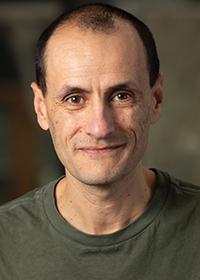 Dr. Claudio Gratton, a professor in the Department of Entomology at the University of Wisconsin, Madison (UW), was elected Fellow in 2022. He is internationally known for his research on the landscape ecology and conservation of beneficial insects in terrestrial landscapes.
Dr. Claudio Gratton, a professor in the Department of Entomology at the University of Wisconsin, Madison (UW), was elected Fellow in 2022. He is internationally known for his research on the landscape ecology and conservation of beneficial insects in terrestrial landscapes.
Gratton was born outside of Rome, Italy, in 1970, and his family immigrated to central Illinois in 1978. He attended the University of Illinois at Urbana-Champaign (UIUC) for his undergraduate studies, where he obtained a B.S. in honors biology. Inspired by his entomology professors at Illinois, he moved to the University of California, Berkeley, in 1991 to enter the entomology graduate program. There he studied the evolutionary ecology and host-specialization of herbivorous insects and obtained his Ph.D. in 1997. Gratton moved to the East Coast for postdoctoral work with Dr. Bob Denno at the University of Maryland, where he shifted his focus to arthropod food webs and predator-prey interactions in salt-marsh ecosystems. In 2003, he started a faculty position in the Department of Entomology at the University of Wisconsin. At UW, he is also an affiliate faculty in the Department of Integrative Biology and the Nelson Institute for Environmental Studies.
Gratton's research on the ecology of arthropods expanded to explore the relationship between agricultural landscapes and insect conservation. Using a range of approaches, including landscape experiments and eco-informatics, his group showed that "simplification" of landscapes in ways that increase the dominance of agricultural land and reduce the diversity of crop and non-crop habitats generally have negative consequences for beneficial insects such as bees and predatory insects. Dispersal from non-crop habitats is often a mechanism through which beneficial insects influence pollination or pest suppression within agricultural fields. The ecology of linkages between adjacent habitats is a broader theme in Gratton's research. He pursued these ideas through work in northern Iceland, where he and his team spent more than 15 years exploring how mass midge emergences from lakes influence soils, plants, and arthropod food webs in the neighboring terrestrial systems. Gratton's work is highly interdisciplinary, as seen in collaborations with colleagues in soils, plant ecology, ecosystem ecology, limnology, and spatial ecology. His interests in the application of science to inform agroecological landscape transformations expanded to include multistakeholder participatory approaches to land-use planning through the development of on models, decision-support systems, and place-based research.
Gratton's scientific work is represented in more than 145 peer-reviewed papers across more than 60 different journals. Gratton has helped train a new generation of interdisciplinary scholars by mentoring seven M.S. students, 10 Ph.D. students, and 15 postdoctoral scientists. At UW, he was awarded a Kellett professorship (2021), honored with Pound (2012) and Romnes (2012) Research Awards, and received a postdoctoral mentoring award (2018). He was honored with a Distinguished Alumnus Lecture at UIUC (2019). Gratton was an Aldo Leopold Leadership Fellow at the Stanford/Woods Institute (2013).
Gratton and his wife, Brenda, are the parents of Elena (a budding entomologist) and Paolo. His less entomological activities include baking bread and pizza, biking down mountainsides, and camping with friends.
